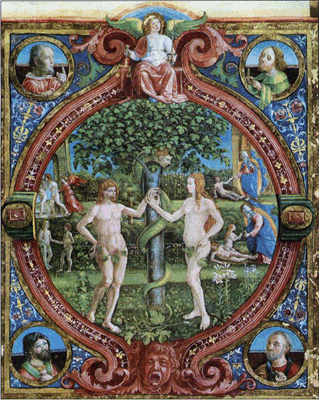Well, besides issues of the balance of freedom and responsibility which is inherent in all properly Montessori environments, and the fact that we follow the child only within a prepared environment full of only good choices, I might mention that Montessori emphasizes time and again that when once a negative action or behavior shows itself we nip in the bud - no warnings, no 1-2-3-Magic, no "reasoning" with the 3 year old. But no strict harsh punishments either - we simply stop the behavior and move on. Don't LET those bad habits develop! As the child ages, more reasoning can occur, but by then, the child has been formed in many good habits and the negative things that come up can be dealt with as they happen. Anyone who says that a young child cannot then possibly reveal anything beautiful and holy to us adults, is not obeying the Lord's words, "Let the little children come to me, for heaven belongs to such as them." Hm. Original Sin. Yet heaven belongs to the children, not to adults.

But someone else has said all of this so much better than I could! In googling to find more information and supportive documentation, I found the following site (please visit to read the full article) and I LOVE this paragraph in particular:
http://www.catholic.net/index.php?option=dedestaca&id=3541
Montessori held and applied the Catholic teaching that man was not completely corrupt with the Fall. She said that "in spite of the moral disorder brought about by original sin, there still remains in human nature a great potentiality for goodness." Montessori used the analogy of wheat in the field to make a point about the natural goodness latent in all children. (51) Inferior wheat plant can grow in the fields without cultivation. Destroying them does not guarantee a good harvest. If the good wheat is to grow it must be cultivated and if it is, the inferior wheat seed will not be able to grow. Montessori says: "The key to the problem is, therefore, not to destroy evil but to cultivate good." (53) Thus allowing the roots of good to sprout in the child´s soul.
And there are all of her own writings - if you read them in full context, they explain themselves! Be sure to look for older publications as somewhere in the 60s, many of her books were re-printed with huge religious sections removed. So newer printings have been heavily secularized.
........................................................
And then I found these:
http://www.nsmontessori.com/NSMCH2.htm
To ignore the child’s spiritual nature is to ignore the very essence and purpose of education.
It is important, in this light, to make Dr. Montessori’s understanding of the nature of the child clear. She considered the child to be good, but broken. The child is good in that he is created to be good, and broken in that he is subject to the effects of Original Sin – as St. Paul lamented in his own behavior - not doing the things he wants to do and doing the things he does not want to do. Her method, she believed, removed many of the obstacles that result in frustration which causes children to lose focus on learning and therefore display ‘broken’ behavior. By freeing the child from these frustrating obstacles, the child becomes able to develop naturally and normally as God had planned. This process she called ‘normalization’.
“Experience has shown that normalization causes the disappearance of many childish traits, not only those which are considered to be defects but also others which are generally thought to be virtues... The disappearance of these childish characteristics shows that the true nature of a child has hitherto not been understood. The universality of this fact is striking, but not entirely new since from the earliest times a twofold nature has been recognized in man. The first was given him at the time of his creation. The second came as a consequence of his first sin, a violation of God’s law. Because of the fall, man was deprived of the blessings of his earlier state and left to the mercy of his surroundings and the illusions of his own mind. This doctrine of original sin can help us understand what happens to a child.”(3)
http://www2.talbot.edu/ce20/educators/view.cfm?n=maria_montessori
(an article about the development of her spirituality)
Montessori in 1948 is reported to have lectured in London where she stated:
I see it-this Original Sin-who would not see a thing so evident? In the depths of the human soul is the possibility of continuous decadence…In fact, there are innate tendencies in man's soul which lead to maladies of the spirit sometimes even unknown to ourselves, just as the germs of disease may work silently, and unknown. This is the death of the spirit which brings insensibility with it. These tendencies come from the soul itself and not from the environment
No comments:
Post a Comment